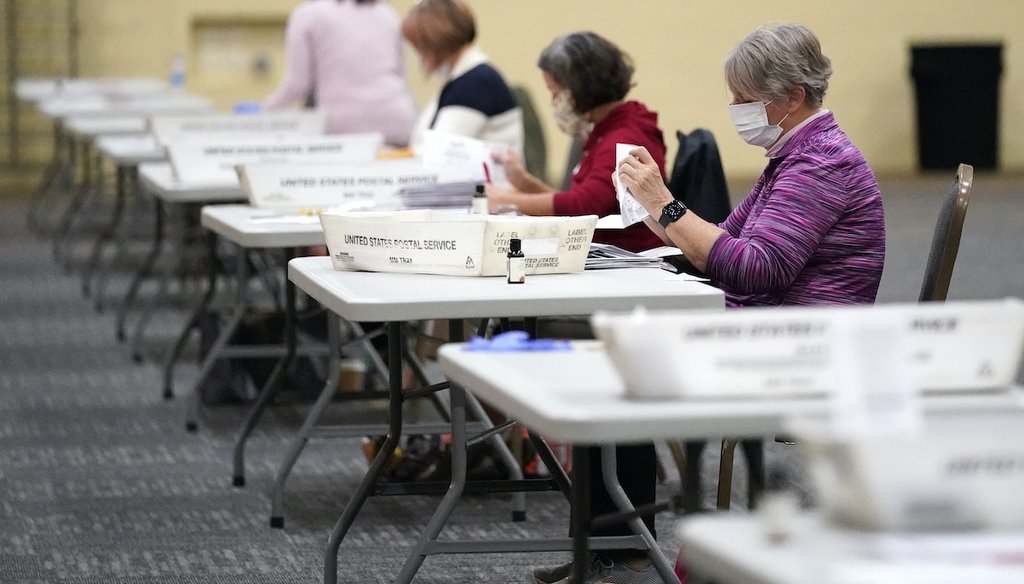Stand up for the facts!
Our only agenda is to publish the truth so you can be an informed participant in democracy.
We need your help.
I would like to contribute

Workers prepare main-in ballots for counting, Wednesday, Nov. 4, 2020, at the convention center in Lancaster, Pa., following Tuesday's election. (AP)
Ted Cruz’s misleading claim that only Democratic cities take days to count votes
If Your Time is short
-
In the 2020 general election, results lagged in some pivotal and closely watched cities, including Detroit, Atlanta, and Milwaukee. Other big cities outpaced their states in vote-counting in 2020, including some of the biggest jurisdictions in Texas, Florida and Arizona.
-
It will inevitably take longer for high-population cities to count their ballots quickly than small-population rural areas will, meaning that simple math is at least as big a factor as partisan control.
-
Cities operate under ballot-handling parameters set by their states, which in many cases have been set by Republicans who occupy state-level offices.
Hoping to proactively rebut misinformation about the reliability of midterm election results, election officials are warning voters not to expect complete results on election night. They say that in many cases, ballots will still be counted in many states days later.
In a tweet, Sen. Ted Cruz, R-Texas, singled out Democratic-led cities for ballot-counting delays.
"Why is it only Democrat blue cities that take ‘days’ to count their votes? The rest of the country manages to get it done on election night," Cruz tweeted Oct. 27, drawing more than 20,000 likes and retweets.
Cruz linked to a New York Post article that said Pennsylvania’s top elections official cautioned that official results in the races for U.S. Senate and governor won’t be available on election night.
Acting Secretary of the Commonwealth Leigh Chapman said that a state law doesn’t allow election officials to start opening mail ballots until 7 a.m. on Election Day. The Republican-led General Assembly unanimously passed an election law in March 2020 that included that start time for processing mail ballots. Months earlier, the state passed Act 77, which stated that any voter could cast a ballot by mail.
Sign up for PolitiFact texts
Ballot counting has lagged in some cities, which in today’s polarized electoral environment are heavily Democratic. But Cruz’s statement is misleading in multiple ways.
We contacted a spokesperson for Cruz to ask whether he had additional evidence beyond the article the tweet linked to. The spokesperson provided no further evidence.
Cruz has a point that some big cities saw slow counts in 2020. We confirmed this using the Wayback Machine internet archive. We checked archived snapshots of The New York Times’ election results page in key states and counties to see how many votes had been reported as counted by the early morning hours the day after the election, Nov. 4. We then compared those figures with the number of ballots ultimately counted when the election was certified.
• In Michigan, Wayne County (Detroit) had counted only about 40% of its ballots at a time when the state had counted 60%.
• In Georgia, Fulton County (downtown Atlanta) had counted 62% when the state had counted 81%.
• In Illinois, Cook County (Chicago) had counted only 75% of its vote when the state as a whole had counted 82%.
• And in Wisconsin, Milwaukee County (Milwaukee) had counted 47% of its ballots by the time the state had counted 78%.
All-mail-voting states such as California, Oregon and Washington state also took a week or more to count ballots, because of the logistical challenges of tallying mailed ballots quickly. Because the all-mail system is used statewide, those delays affected blue and red areas alike.
Each of the counties above that counted slower than their state is a Democratic stronghold, and the trickle of relatively late, and sometimes decisive, ballots fed conspiracy theories among Republicans that votes were being manufactured. But there are solid reasons for the slower pace — and there are plenty of exceptions to Cruz’s rule about the pace of counting in big cities.
In Wisconsin, for instance, Dane County (Madison) had counted well over 90% of its vote by Nov. 4’s early morning hours, noticeably outpacing the state as a whole. Dane cast about three-quarters of the number of ballots Milwaukee County did in 2020, and it was even more strongly Democratic than Milwaukee County was in that election.
In Cruz’s home state of Texas, the bluest big-city areas kept pace or even exceeded the state’s counting pace. Statewide, Texas had counted 87% of its vote by the early morning hours. But Dallas County (Dallas) had counted 92%, Travis County (Austin) had counted 90%, Bexar County (San Antonio) had counted 88%, and Harris County (Houston) lagged only slightly, at 86%.
Meanwhile, more than a dozen Republican counties in Texas had reported less than 70% of the vote counted by that time, most of them with small populations.
In Florida, 86% of the ultimate count was tallied by the early morning hours. But two Democratic-leaning jurisdictions — Broward (Fort Lauderdale) and Miami-Dade counties — exceeded that pace slightly, with 88% and 87% counted, respectively.
And in Arizona, Maricopa County (Phoenix) narrowly beat the statewide counting pace, 79% to 78%. Maricopa, the state’s biggest county, went narrowly for Biden after having supported Republicans in previous elections.
This may seem obvious, but it’s often lost in the debate over the pace of counts: No matter how many election workers you throw at the challenge, it’s going to take cities more time to count the votes, because there are simply more votes to count.
Using Cruz’s Texas as an example, the state has 254 counties. Dozens of them were able to count their votes quickly because they had just a few thousand votes or, in some cases, a few hundred votes to tally. By contrast, Harris County ended up with 1.6 million votes and Dallas County ended up with 922,000.
Because large cities are almost uniformly Democratic these days and small-population rural counties are almost always Republican, it’s easy to cast blame for slow counting on partisan factors. But the reality is that a lot depends on simple math.
No state gets the count entirely "done" on election night.
Featured Fact-check
Some cities, including smaller ones, may complete their unofficial count of ballots on election night. But that’s an unofficial count, and even in small jurisdictions the count may continue in the days that follow as officials sort out at least some ballots, such as absentee ballots that were missing a signature on the envelope or ballots that were cast provisionally. State laws set a deadline for official results, and that deadline is never on election night.
Whether a state "gets it done" on election night, in common parlance, does not always depend on the pace of ballot counting. It depends at least as much on how close a state is expected to be.
In Massachusetts, only 48% of the vote was counted by the early morning hours, and in Washington, D.C. (which has three electoral votes) only 9% was counted. But both jurisdictions are overwhelmingly blue, so media outlets were able to make calls that Biden had won them well before a majority of votes were counted.
Among the states mentioned above that had slow big-city counts, the slow pace in Cook County was basically irrelevant because Biden was expected to be a heavy winner in Illinois. But the pace of counts in Michigan, Georgia and Wisconsin were more consequential, and more widely noticed. That’s because the races were close in each, and collectively, those states were pivotal for determining the presidency.
It’s important to note that these populous cities operate under ballot-handling parameters set by their states. In some cases, those rules, which determine when election officials can start processing mail ballots, are set by Republicans in state-level offices.
The rules vary greatly from state to state. In some states, opening up mail ballots can’t start until Election Day. In other places, it can begin weeks before.
Every state also sets its own deadline for the receipt of domestic absentee or mail ballots. The most common deadline is by the close of polls on Election Day. However, 19 states will accept ballots received after Election Day if they are postmarked on or before (sometimes only before) Election Day.
Cruz said that only Democratic cities take "‘days’ to count their votes" while "the rest of the country manages to get it done on election night."
He has a point that some cities — which, given today’s political environment, almost always lean Democratic — trailed their state’s pace in the vote counting in 2020. This included some pivotal, and closely watched, cities in that presidential race, including Detroit, Atlanta and Milwaukee.
However, other big cities actually outpaced their states in vote-counting in 2020, including some of the biggest jurisdictions in Texas, Florida and Arizona. It will inevitably take longer for high-population cities to count their ballots quickly than small-population rural areas do.
Finally, it’s important to note that cities operate under ballot-handling parameters set by their states, which in some cases have been set by Republicans who occupy state-level offices.
The statement contains an element of truth but ignores facts that would give a different impression, so we rate it Mostly False.
RELATED: Not all results will be known on election night 2022. That’s normal
RELATED: Why France reports election results faster than the US
RELATED: Sen. Ted Cruz on the Truth-O-Meter
Our Sources
Sen. Ted Cruz, Tweet, Oct. 27, 2022
Wayback Machine archived versions of New York Times election results pages in the early hours of Nov. 4, 2020, for Michigan, Georgia, Illinois, Wisconsin, Texas, Florida, Arizona, Massachusetts, and Washington, D.C., accessed Oct. 28, 2022
Dave Leip’s Atlas of U.S. Presidential Elections, accessed Oct. 28, 2022
Philadelphia Inquirer, How long will it take to get Pa. election results? Here’s what you need to know. Oct. 20, 2022
NBC Meet the Press, Interview with Leigh Chapman, acting secretary of the Commonwealth of Pennsylvania, Oct. 25, 2022
WLVR, Pa.'s acting Secretary of State warns of possible delays in election results, Oct. 25, 2022
Pennsylvania, Act 12 of 2020, March 27, 2020
National Conference of State Legislatures, Table 11: Receipt and Postmark Deadlines for Absentee/Mail Ballots, July 12, 2022
County Commissioners Association of Pennsylvania, CCAP news release: County leaders share frustrations with lack of action on election priorities, June 1, 2021
Email interview, Trey Grayson, Member, Frost Brown Todd LLC and Managing Director, CivicPoint, Oct. 27, 2022
Email interview, Stephen Richer, Maricopa County Recorder, Oct. 27, 2022
Email interview, Jennifer Morrell, partner at The Elections Group, Oct. 28, 2022
Email interview, Ellen Lyon, Pennsylvania Secretary of the Commonwealth spokesperson, Oct. 28, 2022
Browse the Truth-O-Meter
More by Louis Jacobson
Ted Cruz’s misleading claim that only Democratic cities take days to count votes
Support independent fact-checking.
Become a member!
In a world of wild talk and fake news, help us stand up for the facts.



























































